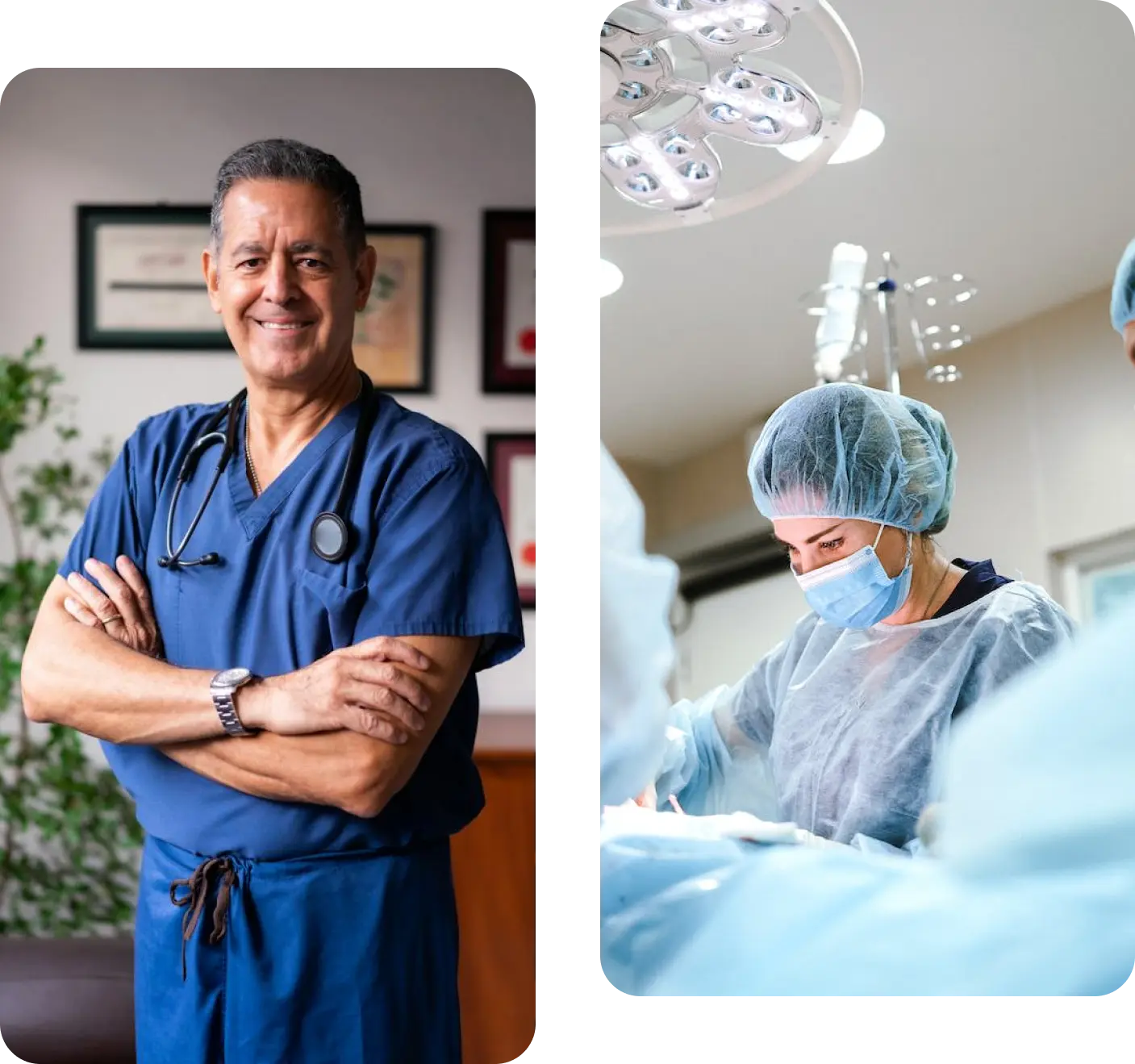What to Expect: The Informative Guide for Weight Loss Surgery in Mexico

You’ve read every article.
You’ve done as many deep dives into the subject “weight loss surgery” as your brain can handle.
But still…you don’t feel as though there is one site, one source that has been able to give you all the information you need in an accurate and easy-to-understand way.
For a person who is trying to research weight loss surgery, the internet can begin to feel more like a burden than a blessing.
From outdated information to confusing medical jargon, the internet can quickly transform from a helpful resource into a swirling vortex of uncertainty.
Are you ready to find a guide that is unbiased, up-to-date, and able to explain weight loss surgery in a way that makes sense to you?
Then you’ve come to the right place.
key takeaways
- The Basics: What is Weight Loss Surgery and Who is a Candidate?
- Before the Surgery: How to Prepare for a Bariatric Procedure
- Choosing Your Center: How to Determine What’s Right for You
- After the Surgery: What You Should Expect Next
- Common Questions to Ask Before Committing
- Mexico Weightloss Surgery Center…The Answer You’ve Been Waiting For
While the world of weight loss surgery continues to improve and evolve, potential patients need accurate and straightforward information more than ever before.
From breaking down the various types of bariatric surgery available today to giving you accurate pre-op and post-op expectations, this guide is going to be everything you’ve been looking for.
Let’s get started!
The Basics: What is Weight Loss Surgery and Who is a Candidate?
Embarking on a weight loss journey through surgery is a significant decision that requires a comprehensive understanding of the procedures involved and the criteria for candidacy.
Let’s start with the basics and make sure you understand what the surgery entails and whether or not you are a good candidate for it.
Understanding Weight Loss Surgery Techniques
Bariatric weight loss surgery comes in various forms, each designed to address specific needs and goals.
The following are the most effective bariatric weight loss surgeries that are available today.
Gastric Sleeve Surgery:
This procedure involves reducing the stomach’s size, and limiting the amount of food it can hold. It promotes weight loss by restricting the quantity of food intake.
Gastric Bypass Surgery:
A more intricate surgery, gastric bypass alters the digestive process by creating a smaller stomach pouch and bypassing part of the small intestine. This leads to reduced calorie absorption and significant weight loss.
Biliopancreatic Diversion with Duodenal Switch Surgery (BPD-DS):
This complex procedure is recommended for individuals with severe obesity and associated metabolic conditions like type 2 diabetes. It typically results in rapid and significant weight loss.
Revision Surgery:
Sometimes, previously performed procedures require adjustments or need to be addressed due to unforeseen complications. There are many bariatric surgeons who excel in offering revision surgery solutions, ensuring the continued effectiveness and success of your weight-loss journey.
Understanding the mechanics of these weight loss surgery procedures is crucial in making an informed decision about which might align best with your weight loss goals.
Am I a Candidate for Bariatric Surgery?
One of the first questions you probably had when you began your research was whether or not you would qualify as a good candidate for undergoing weight loss surgery.
While weight loss surgery can be transformative, not everyone is an ideal candidate. It’s essential to consider several factors before making this life-changing decision.
Here are the key criteria that will help you determine if weight loss surgery is right for you:
Why is a Consultation Before Bariatric Surgery so Important?
Determining your candidacy for weight loss surgery is not a decision to be made alone.
Even if you and/or your primary care physician believe that bariatric surgery is going to be the most effective way to help you lose weight, you’ll still want to meet with an experienced bariatric surgeon before you decide.
These specialists can provide personalized guidance, assess your unique situation, and help you navigate the complexities of weight loss surgery.
A reputable weight loss surgery center will always suggest you start with a consultation. For those who elect to travel to Mexico to undergo weight loss surgery, the initial consultation can easily be done electronically.

Afterwards, you should feel confident and comfortable with the surgeon you have chosen and enthusiastic about the recommendations they have made.
Schedule Your Consult
Explore candidacy. Book a consultation to learn more about your eligibility and take the next step towards your goals.

Before the Surgery: How to Prepare for a Bariatric Procedure
Preparing for weight loss surgery involves more than just scheduling a date for the procedure or even talking to your bariatric surgeon.
Your preparation is also going to require a focus on your physical health, mental health, and a number of logistical aspects to get you ready.
Here is a detailed guide on how to prepare effectively for your upcoming bariatric procedure, particularly if you are going to elect to have your weight loss surgery in Mexico.
Physically Prepare Yourself
Mentally Prepare Yourself:
A Pre-Op Checklist to Consider
Remember, adequate preparation is key to a successful bariatric procedure. By focusing on both physical and mental aspects and completing essential pre-op tasks, you set yourself up for a smoother surgery and a more successful weight loss journey.
Choosing Your Center: How to Determine What’s Right for You
Selecting the right bariatric surgery center is a pivotal decision in your weight loss journey that will significantly influence the success of your weight loss journey.
Let’s look at some things you can do to make sure you choose the best bariatric surgery center for you.
Your Surgeon Matters:
Emphasizing the Surgeon’s Role: Acknowledge that the bariatric surgeon plays a central role in the success of your weight loss surgery. Their expertise, experience, and approach greatly impact the outcome.
Vetting Your Bariatric Surgeon:
Certifications: Ensure your surgeon is certified by reputable boards, such as the Mexican Council of Surgery for Obesity and Metabolic Diseases. This signifies adherence to industry standards.
Reviews and Testimonials: Read patient reviews and testimonials. Real experiences offer insights into the surgeon’s skills, bedside manner, and postoperative support.
Membership in Professional Organizations: A surgeon’s affiliation with respected organizations, such as the American Society of Gastrointestinal and Endoscopic Surgeons, reflects an ongoing commitment to excellence.

The Facility Matters:
Understanding Bariatric Surgery Centers:
Accreditations: Choose a center accredited by relevant medical authorities. Accreditation ensures adherence to stringent quality and safety standards.
Skilled Staff: Assess the expertise of the medical staff. Skilled nurses, anesthesiologists, and supporting personnel contribute to a smooth and safe surgical experience.

Postoperative Support: A comprehensive center provides robust postoperative support. This includes nutritional counseling, psychological support, and follow-up appointments to monitor progress.
State-of-the-Art Facilities: Opt for a center equipped with modern facilities. Advanced technology contributes to the efficiency and safety of surgical procedures.
Choosing the right bariatric surgery center involves a meticulous evaluation of both the surgeon and the facility. By prioritizing certifications, patient testimonials, and facility accreditations, you enhance the likelihood of a positive and successful weight loss journey.
After the Surgery: What You Should Expect Next
Embarking on the post-surgery phase is a crucial part of your weight loss journey, requiring careful navigation through significant changes in physical, dietary, and activity aspects.
Here’s a comprehensive guide on what to expect and how to make this phase as smooth and successful as possible.
Physical Transformations:
After weight loss surgery, it’s crucial to acknowledge the existence of a recovery period.
While discomfort may be present initially, as your body undergoes the healing process, you’ll begin to observe positive changes in mobility and overall well-being.
Additionally, it’s important to be mindful of potential changes in skin elasticity following significant weight loss.
While shedding excess weight is advantageous, some individuals may experience persistent loose skin. In such cases, certain patients choose to explore additional procedures aimed at addressing this specific aspect of their transformation.

Dietary Adjustments:
Adhering to the dietary plan outlined by your medical team is crucial for a successful recovery after weight loss surgery. This includes understanding the importance of Nutrition After Weight Loss Surgery Mexico.
Follow the prescribed guidelines for introducing various food textures and types gradually. This approach ensures optimal digestion and proper nutritional intake, contributing to your overall well-being.
Additionally, depending on the type of surgery, it’s essential to consider ongoing supplementation. Vitamins and minerals may be required to maintain optimal health, and discussing these needs with your medical team will contribute to a comprehensive post-surgery care plan.

Activity Expectations:
Embark on a journey of gradual exercise as recommended by your medical team post-weight loss surgery.
Begin with gentle exercises and follow their guidance for incremental increases in activity. This approach contributes to enhanced strength, flexibility, and overall fitness over time. Moreover, embrace a more active lifestyle to support sustained weight loss and boost overall health.
Recognize the pivotal role of physical activity in your journey and make these lifestyle changes an integral part of your post-surgery routine.

Navigating the post-surgery landscape requires a holistic approach, incorporating physical, dietary, and activity adjustments.
With the right support resources, adherence to guidelines, and a focus on comfort, you can optimize your post-surgery experience and set the stage for long-term success.
Mexico Bariatric Experts
Uncover the Renew Bariatrics Difference with Mexico Bariatric Experts – Your personalized journey to transformative well-being.
Common Questions to Ask Before Committing
Before embarking on the transformative journey of bariatric surgery, it’s essential to have a comprehensive understanding of what to expect. Here is a list of common questions that many patients contemplate, along with informative answers to guide your decision-making process.
Is bariatric surgery right for me?
Bariatric surgery is a viable option for individuals struggling with obesity, especially those with a body mass index (BMI) above 30.
A consultation with a bariatric surgeon is crucial to determine candidacy based on individual health and lifestyle factors.
What types of bariatric surgeries are available?
Answer: There are several types of bariatric surgeries, including gastric sleeve, gastric bypass, gastric balloon, and more. Each procedure has unique benefits and considerations. Your surgeon will recommend the most suitable option based on your specific health needs.
What are the risks and complications associated with bariatric surgery?
While bariatric surgery is generally safe, like any surgical procedure, it carries potential risks. These may include infection, bleeding, blood clots, and, in rare cases, more severe complications. Thorough discussions with your surgeon will address individual risk factors.
How much weight can I expect to lose?
Weight loss outcomes vary, but patients can typically expect to lose 50-80% of their excess weight within 12 to 18 months post-surgery. The extent of weight loss depends on factors like the chosen procedure, adherence to lifestyle changes, and individual metabolism.
Will insurance cover the cost of bariatric surgery?
Coverage varies among insurance providers. Some plans may cover bariatric surgery if specific criteria are met. It’s essential to check with your insurance company and work with your medical team to navigate the approval process.
This uncertainty around insurance coverage is also why many patients choose to look at Mexico for a more affordable weight loss surgery option. As medical tourism continues to grow, undergoing bariatric surgery in a country like Mexico is becoming a bigger option.
What lifestyle changes are required after bariatric surgery?
Lifestyle changes are integral to post-bariatric success. Patients who choose weight loss surgery must also choose to adopt healthier eating habits, regular exercise, and lifelong commitments to nutritional and behavioral changes.
How long is the recovery period?
The recovery period varies by procedure but typically ranges from a few weeks to several months. Following the post-operative guidelines, attending follow-up appointments, and gradually reintroducing activities will contribute to a smoother recovery.
Will I experience loose skin after weight loss?
Loose skin is a common concern after significant weight loss. Factors such as age, genetics, and the rate of weight loss influence skin elasticity.
Some patients opt for additional procedures like skin removal surgery to address this concern.
How soon after surgery can I return to work?
The return to work varies based on individual healing and the nature of the job. Some individuals may resume light duties within a week, while others may require a more extended recovery period.
What dietary restrictions will I have to follow?
Answer: Post-surgery dietary guidelines involve a progression from liquid to solid foods. Patients follow a modified diet, emphasizing protein intake, limiting sugar and fats, and prioritizing nutrient-dense options.
How long before I start seeing results?
Patients may notice initial changes soon after surgery, but significant results typically manifest within a few months. The pace of results varies, with continuous improvements over the following months.
How safe is bariatric surgery in general?
Bariatric surgery is generally safe when performed by experienced surgeons in accredited facilities. Risks are minimized through laparoscopic techniques, and the benefits often outweigh potential complications for individuals struggling with obesity. Regular follow-ups with the medical team enhance safety and success.
Mexico Weightloss Surgery Center…The Answer You’ve Been Waiting For
You’ve done the research.
You’ve got all the answers.
Are you ready to take the next step?
At Mexico Weightloss Surgery Center, we know that the decision to have bariatric surgery is nothing short of an enormous one. And we know that we can help make this one of the most satisfying and successful decisions you’ve ever made.
If you’ve asked all the questions and done all the research, why not reach out today?
PRICING & COSTS
Explore surgery expenses and pricing details to better understand the associated costs for your medical procedure.
FEATURED BLOGS
How to Choose Mexico Bariatric Surgeon
Concerns about having a bariatric procedure is a normal and expected element of the decision. These worries are…
Read MoreWhich Bariatric Surgery is Best?
Obesity is one of the most common health issues in America. Obesity may further lead to a number of…
Read More
